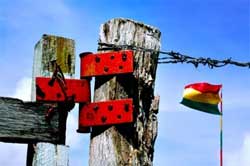
In a small town in Colombia, a group of farmers is resisting the war which has devastated their villages, their families, and their livelihoods. Around the boundaries of their 200 acre farm, they’ve posted signs which read: Territory of Life, and Humanitarian Zone. On each sign, they list the five core values of the community, one of which prohibits the presence of any of Colombia's illegal armed militias, such as the FARC (Revolutionary Armed Forces of Colombia) or the AUC (United Self-Defense Forces of Colombia). This prohibition also extends to Colombia's military and police forces, which have a troubled history of human rights abuses and collusion with the illegal militias. Instead, the community asks for the presence of unarmed, civilian accompaniment from the Colombian government, from national and international NGOs (non-governmental organizations), and from international observers. They call themselves the Balsita Community of Life and Work.
We first visited the Balsita Community in 2002. We wanted to learn how a group of twenty-three families could use non-violent strategies to resist a seemingly intractable war that has gone on for decades. The United Nations estimates three million have been made homeless by this war in the last twenty years. Most of these refugees flee to the cities. We wanted to see a community that, against the odds, has come up with a way to preserve its rural way-of-life. We wanted to understand how they cope with the trauma of their past experiences. Opening their homes to us, sharing their stories, their hopes, and their struggles seems to be part of that path. They tell us: It hurts us to remember, but it hurts us more to forget.
Here you will find part of their story. You will also find a bit of ours — the repeated journeys of two women from Seattle, a photojournalist and a writer & musician to a farm tucked into the hills above a town called Dabeiba, Colombia.